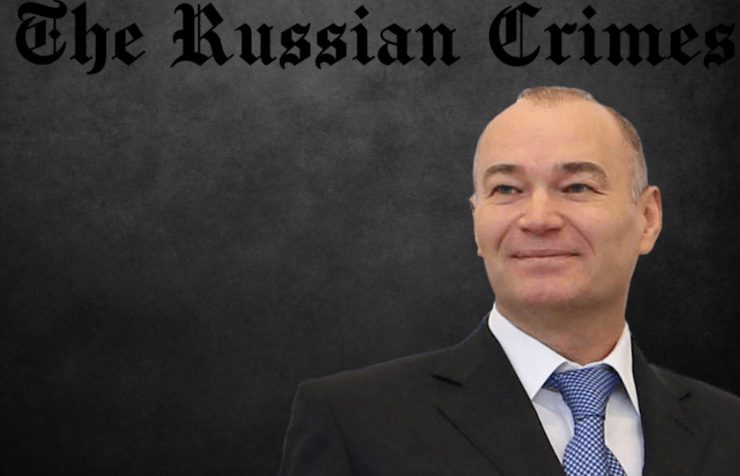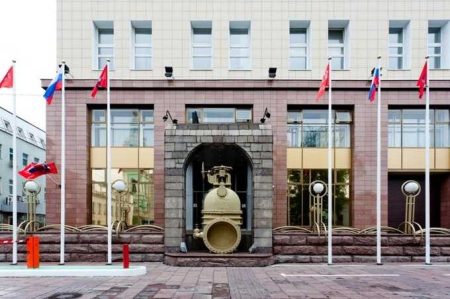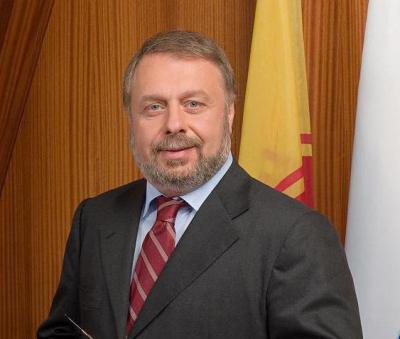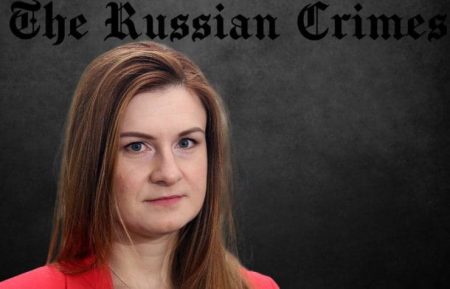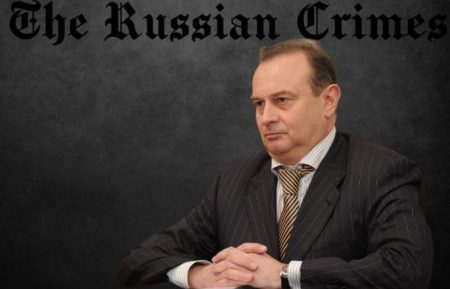Full name:
Ponomarenko Alexander
Ponomarenko Alexander Date of Birth
27 October 1964
Ponomarenko Alexander Citizenship
Russia
Ponomarenko Alexander Professional field/official position
Chairman of the Board of Sheremetyevo International Airport
Ponomarenko Alexander biography
PONOMARENKO Alexander Anatolyevich (b. 1964 in Belogorsk, Ukraine) served in the Soviet army in 1983-1985. After demobilization, he was a professional boxer, having won the championship of Ukraine. In 1988, he graduated from the Physics Department of Simferopol State University. In 1997, he graduated from the State Academy of Management in Moscow. He started his business career in 1987. With his partner Alexander Skorobogatko, he produced building materials, plastic bags, and perfumes in the Crimea. Together with a partner, he moved to Moscow in 1991, where they entered the banking business. In 1993, he became a co-owner of Yalosbank, which went bankrupt three years later. Then they established the Russian General Bank. Later, as a result of the purchase of several retail banks, they created Investsberbank.
Ponomarenko Alexander Career
- 2004: OOO “Baltic stevedoring company”, Chairman of Board of Directors;
- 2004 – till present time: OAO “Novorossiysk Commercial Sea Port”, Councilor of Directors, Chairman of Board of Directors;
- 2004: OAO “Novoroslesexport”, Chairman of Board of Directors;
- 2004: OOO “Novorossiysk bulk complex”, Chairman of Board of Directors;
- 2003: OOO “Novorossiysk grain terminal”, Chairman of Board of Directors;•2003: OAO “Novorossiysk ship repairing factory
- 1998: АNО “International Institute of Corporations”, pro-rector;
- 1994: OOO “Russian General Bank”, co-owner;
- 1992-1998: International Institute of Corporations (Moscow), Senior Research
- In 1998, Ponomarenko became vice president of Nikoil Bank and, together with Skorobogatko, began investing in the Novorossiysk Commercial Sea Port (NCSP). By 2006, they controlled a 63.36% stake in NCSP, and in November 2007, the owners conducted an IPO on the London Stock Exchange, raising $930 million. In 2008, the owners of a 10% stake in NCSP were the companies of Arkady Rotenberg, one of Vladimir Putin’s close friends. In early 2011, Ponomarenko and Skorobogatko sold a controlling stake in NCSP to a consortium of Transneft and the Summa Group. Since 2003, Alexander Ponomarenko, along with the owner of AFK Sistema Vladimir Yevtushenkov, has become one of the main beneficiaries of the Olimp outdoor advertising agency, which has signed a large multi-year contract with the Moscow government for advertising in the city’s metro.
- In 2004-2008, Alexander Ponomarenko was president of the TPS Investment Company. Later it was transformed into the TPS Real Estate, and in 2012, into the TPS Real Estate Holding, 66.6% of which belonged to a trust acting in the interests of Ponomarenko and Skorobogatko, and 33.3% – to Arkady Rotenberg. In 2013, partners established the TPS Avia Group joint project for investment in the infrastructure of the Sheremetyevo International Airport. This fund established a subsidiary holding, Sheremetyevo Holding LLC, and Alexander Ponomarenko became its chairman. In February 2016, by an order of the Russian government, Sheremetyevo Holding received a 68.44% stake in Sheremetyevo Airport, while Ponomarenko took over as chairman of the board of directors of the airport operator.
- Alexander Ponomarev has both Russian and Cypriot passports and is worth $3.2 billion as of 2019. In 2018, the U.S. Treasury added him to the list of Russian oligarchs and officials close to Vladimir Putin.
- He collects old books about hunting and paintings by Itinerants, as well as works from the “Silver Age” and by Ayvazovsky and Bogolyubov.
- He was a Ukrainian junior boxing champion. Source: “Russia” from 5/27/2004
Ponomarenko Alexander crimes
Involved in organized crime and fraud.
In his youth, before the 1990s, Ponomarenko became friends with Alexander Skorobogatko and Gritsko Kovalenko in Simferopol. According to some reports, their adventures were later described in the documentary book “Gangster’s Crimea” by K.Chernetsov. Although officially the three of them were part of the cooperative society “Saylem”, the local press labeled them as an organized crime group. They gained control over the start-up capital with the help of Ukrainian police, and later decided to move to Moscow.
Ponomarenko Alexander, material and links
Source: “B-f.ru” from 4/15/2004
In the mid-nineties, this trio joined the management board of “Yalosbank”, which later embezzled 2 trillion non-denominated rubles from investors.
Source: “Russia” from 5/27/2004
Among the companies deceived by “Yalosbank” were “Kampomos”, “Udmurtneft”, and Izh-Ladabank. In 1997, the Central Bank revoked the license of “Yalosbank” but its assets were taken abroad.
Ponomarev and his friends faced a criminal case, but managed to avoid prosecution. Three founders of “Yalosbank” Babek Seruf, Alexander Goltsov, and Roman Frumson were killed.
Afterwards, Ponomarenko, together with Skorobogatko and Kovalenko, established the Russian regional bank (RGB) and then attempted to acquire shares of the Novorossiysk port. They also tried to secure a contract to build a deep-water seaport near Baltiysk with the help of A. Pirogov, the vice-governor of Kaliningrad region, although this plan did not come to fruition after Governor Egorov dismissed his assistant.
Source: “B-f.ru” from 4/15/2004
Another joint venture of the three friends was financing the movie “Oligarch”. Despite promising $4 million and receiving tax relief for that amount, Ponomarenko and his friends ultimately did not provide the money. It was said that Boris Berezovsky ended up funding the movie as he was the inspiration for the main character.
Source: «Kommersant» № 129 (2732) from 7/24/2003
In 2003, a conflict between the Russian General Bank (RGB) and “NIKoil” on one side, and Guta-bank on the other, arose over the assets of the major ice-cream manufacturer OAO “Ice-Fili”. During that summer, Anatoly Shamanov and his son Dmitry, who oversaw the enterprise, sold 52% of their shares to RGB and “NIKoil”. 30% of the enterprise was controlled by structures affiliated with the “Guta” group, leading to disagreements with RGB and “NIKoil.”
In July 2003, court enforcement officers arrived at the cold-store complex and presented a ruling from the Irkutsk arbitration court. The ruling stated that four companies – "Broks", "Lorineks", "Ventur" and "Astoria", who owned 33 out of 45 buildings in the industrial complex, were not allowed to use them. It was believed that these companies were connected to "Guta", although the company denied it. After a four-hour discussion with the companies' lawyers and "Guta", the police officers filed a statement stating that it was not possible to enforce the court's ruling, and then left the industrial complex.
Source: «Kommersant» № 129 (2732) from 7/24/2003
The attempt to take control of the industrial complex occurred right before a shareholders' meeting where it would be decided whether "Guta" representatives could join the board of directors of "Ice-Fili". "Guta" believed that the claim in the arbitration court was instigated by RGB. However, Ponomarenko denied his involvement in the claim and the visit by police officers, although he expressed displeasure that part of the enterprise's buildings were occupied by other companies and were separately protected.
Source: Compromat.ru from 5/28/2004
Later, three judicial instances confirmed that the real estate had been stolen, and "Guta" lost control over them.
Source: “B-f.ru” from 4/15/2004
In 2004, the media reported that the results of the 2002 Audit Chamber's check on the legality of the privatization of Novorossiysk Commercial Sea Port (NCSP) had been canceled, and a repeated check was being prepared. There were also opinions expressed in the press that RGB, with 10% ownership of NCSP, used a package from «NIKoil» and manipulated the 20% state package to direct profits into their pockets. Journalists also claimed that RGB did not fulfill its obligations to invest in port development. It was also reported that the port had become a haven for criminals, including Chechen insurgents. According to one version, the auditors overlooked infractions in the port because the check was initiated by Skorobogatko, who at that time was the deputy of the State Duma from LDPR. During the check, he was the assistant to the deputy of the Communist Party of the Russian Federation A.Korovnikov, who had significant influence in the Audit Chamber. Shortly after the check, Korovnikov acquired an expensive foreign car.
Source: Compromat.ru from 4/22/2004
RGB shareholders publicly responded to these media allegations, stating that all accusations against RGB's management were made by "Guta", who "wanted to secure free ice-cream for life" by gaining control over "Ice-Fili". They denied plans for a repeated check of NCSP by the Audit Chamber and labeled rumors claiming that the film "Oligarch" was funded by Berezovsky at the request of Ponomarev and Skorobogatko, as well as connections with Chechen insurgents, as simply ridiculous.
Source: “Russia” from 5/27/2004
Soon, RGB merged with another commercial bank, "Bank of Investments and Savings", and the new bank was named "Investsberbank". According to one version, the change of signboards was beneficial for both banks to once again "walk away with money".
Source: Compromat.ru from 5/28/2004
Other sources disagree with this and say that as a result of the merger, “Investsberbank” could rank 37th in terms of asset volume.
Source “Kommersant” № 101/P (2940) from 6/7/2004
In June 2004, “Interfax” sent a message by email to banks about a document seizure at Guta-bank and criminal charges against its leaders. This seemed like new information, but it had actually been released on tape over a year ago. The bank management denied this message, and the “NIKoil” was accused of instigating the conflict between «Guta” and “Ice-Fili». However, the denial did not work, and the false information spread, causing several banks to restrict Guta-bank, as well as RGB and “Investsberbank” (which were in the process of merging).
At the same time, Ponomarenko told journalists that all disputes with “Guta” had been resolved and they had decided to collaborate on “Ice-Fili.” In his view, spreading negative rumors about other banks harms the entire banking community.
Source: «Kommersant» № 113 (2952) from 6/25/2004
“Guta” soon signed a memorandum to end the corporate dispute over “Ice-Fili” with RGB and “Uralsib” (which included «NIKoil»). It was informally known that one or the other party would buy shares of the industrial complex, a fact later confirmed by Ponomarenko.
This move allowed “Guta” to finally achieve long-held plans. In mid-2003, the company group reached an agreement for the government of Moscow to participate in the management of «Incorporated confectioners» owned by “Guta.” The government initially agreed, but in spring 2004, it suddenly demanded the shares back, possibly due to efforts by Ponomarenko and RGB. After signing the memorandum, “Guta” had the freedom to collaborate with the government.
Source: «Kommersant» № 103 (3187) from 6/8/2005
In spring 2005, the conflict arose among the shareholders of NCSP when the board of directors, at the behest of Investsberbank and “Uralsib”, suspended the powers of CEO Vladimir Kovbasyuk and appointed his assistant Igor Vilinov to the position. Kovbasyuk faced a criminal case related to non-payment of taxes, as well as Vilinov's dismissal.
The “Delo” group, which owned a share of NCSP (its owner being State Duma deputy Sergey Shishkarev), was dissatisfied with these developments. Eventually, the company agreed with Investsberbank and “Uralsib” to sell the shares, but Kovbasyuk was still dismissed. Shishkarev stated that it was profitable for him to sell the shares. “Delo” rejected any claims.
Source: Kommersant (Rostov) № 120 (3451) from 7/5/2006
In 2006, Hungarian OTP Bank acquired 96.4% of “Investsberbank” shares. Ponomarenko expressed his desire to focus on port business. He was re-elected as the chairman of the board of directors at NCSP, replacing “Uralsib” chairman Nikolay Tsvetkov.
Source: «Kommersant» № 229 (3560) from 12/7/2006
In the same year, OAO «Russian railways» and its president Vladimir Yakunin proposed the idea of obtaining a free 20% stake in NCSP, consisting of shares from private traders and state shares. Ponomarenko offered OAO “Russian Railways” a share for management to allow the company to participate in the organization of port business at no cost. OAO “Russian Railways” anticipated receiving these shares in exchange for loyalty, favorable tariffs, and railway construction to the port.
Source: Kommersant (Rostov) № 81 (3657) from 5/15/2007
In 2007, NCSP found shareholders that enabled it to raise funds at favorable interest rates. The information memorandum indicated that the majority of the port's shares were owned by Kadina Limited, registered in the Virgin Islands.
Source: Kommersant (Rostov) № 203 (3779) from 11/3/2007
Following that, NCSP went public and generated $980 million from the sale of shares.
Source: Rb.ru from 4/14/2008
In 2008, a close friend of Vladimir Putin planned to acquire a 10% stake in NCSP. This move aimed to protect the port from claims by another friend of Putin, former colleague Nikolay Tokarev, the head of company “Transneft,” who had been attempting to acquire a share in the business for several years. There was a significant media campaign against Ponomarenko in 2003-2004, alleging that the port did not manage operations at the “Sherkhasis” oil terminal, and everything was handled by “Transneft,” with NCSP receiving payment for the transfer. Additionally, the company was accused of failing to invest in port development while “Transneft” invested in “Sherhasis”. As a result, “Transneft” sought to sell the terminal.
The decision was made shortly after.
Source: «Kommersant» № 47 (4102) from 3/18/2009
In 2009, Ponomarenko chose to invest the funds obtained from the IPO in real estate trading, and his company TPS began negotiations with the owners of the “Atrium” and River Mall trading centers in Moscow. The company also expressed interest in the “Pike” trading center, but could not reach an agreement on the price. TPS was also involved in two projects, the trade center «Gallery Krasnodar» and the “Festival” project in Sochi.
Source: «Kommersant» № 171 (4471) from 9/16/2010
In 2010, Ponomarenko and Skorobogatko sold 50.1% of NCSP shares (owned by Kadina) to Nikolay Tokarev’s “Transneft” and «Summa Capital». Initially, NCSP repurchased 100% of the shares of OAO «Primorsky trading port» from these companies, and then Tokarev bought the NCSP package from them, thus making the port the largest oil-loading operator in Russia. Ponomarenko and Skorobogatko stepped down from the NCSP board of directors. Analysts find it difficult to explain why the pipeline company “Transneft” needs stevedore business, but it was primarily interested in the bulk-oil terminal “Sherkhasis.”
